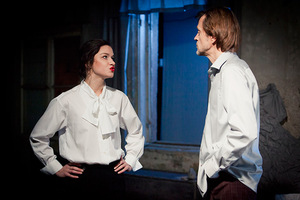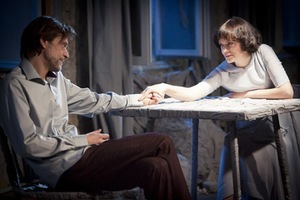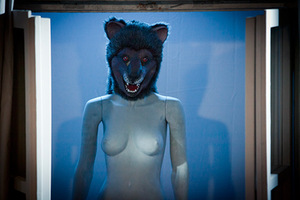When We Dead will not Awaken 62
In brief: Active creative life is taking place in Kaunas State Drama Theatre. Here, in addition to the usual premieres staged in the big halls of the theatre and the repertoire shows, the country's young directors are testing their creative powers in the smaller spaces. Monika Klimaitė was the first to get the opportunity to stage a play on this theatre's stage. Her work When We Dead Awaken can be seen at the Long Hall.
M. Klimaitė doesn't try to be rowdy on the stage when deconstructing or modernizing the drama written more than a century ago. On the contrary, she is viewing the work of the most prominent Norwegian playwright Henrik Ibsen with the utmost respect. However, it is not a blind scenic illustration of the text as it might seem. The young artist highlights the universality of the topics explored in the play by removing any reference to a specific time period.
M. Klimaitė allows the metaphysical dimension to intervene into the real events, but the manifestations of the invisible world that cause fear and anxiety remain only a few in the play and that world is also looked into too carefully. On the stage, the focus is on the flow of the simple everyday life - that opens up in the drama - and to what we build and destroy ourselves. The specification is avoided not only when it comes to time and space, but also when it comes to any ideology, in order to leave as much freedom as possible for the viewer's interpretation.
I would like to commend artist Paulė Bocullaitė and composer Tadas Žukauskas who prevent the play from becoming too drama centric, in which everything is usurped by the verbal word and all the other elements of the play's structure only obey it. The grey color code of P. Bocullaitė's scenography very aptly conveys the atmosphere of the play, an integral part of the concept of death, both in the literal and figurative sense.
As for the acting, I would mostly like to commend Dainius Svobonas and Inga Mikutavičiūtė who played the (un)happy family of intellectuals. It's paradoxical, but listening to their conversations it is hard to believe that their relationship is at a stalemate. Although they are fighting, their quarrels seem comical and somehow attractive. This time, I. Mikutavičiūtė's beloved role of slightly hysterical and capricious woman quite aptly blew in some life into the character of Maia. It often seems that she is the only one awake among the others who are sleeping (dead).











